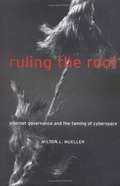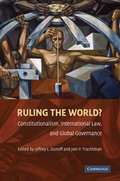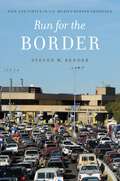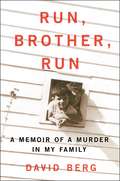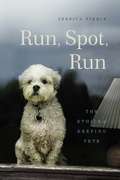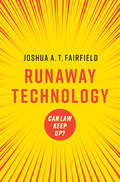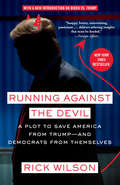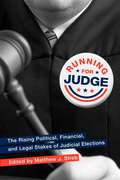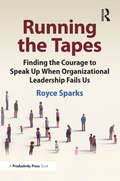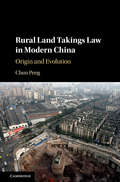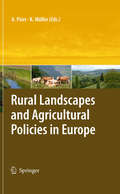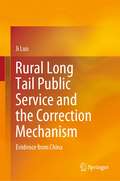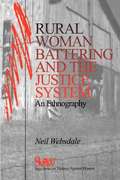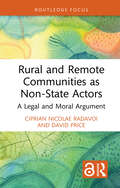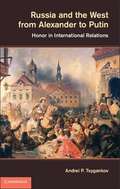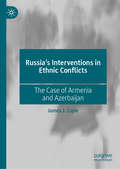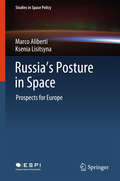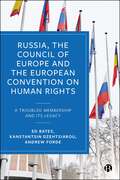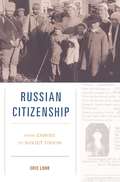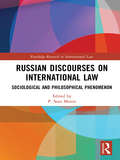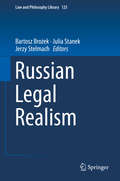- Table View
- List View
Ruling the Root: Internet Governance and the Taming of Cyberspace
by Milton L. MuellerIn Ruling the Root, Milton Mueller uses the theoretical framework of institutional economics to analyze the global policy and governance problems created by the assignment of Internet domain names and addresses.
Ruling the World? Constitutionalism, International Law, and Global Governance
by Jeffrey L. Dunoff Joel P. TrachtmanRuling the World?: Constitutionalism, International Law, and Global Governance provides an interdisciplinary analysis of the major developments and central questions in debates over international constitutionalism at the UN, EU, WTO, and other sites of global governance. The essays in this volume explore controversial empirical and structural questions, doctrinal and normative issues, and questions of institutional design and positive political theory. Ruling the World? grows out of a three-year research project that brought twelve leading scholars together to create a comprehensive and integrated framework for understanding global constitutionalization. Ruling the World? is the first volume to explore in a cross-cutting way constitutional discourse across international regimes, constitutional pluralism, and relations among transnational and domestic constitutions. The volume examines the core assumptions, basic analytic tools, and key challenges in contemporary debates over international constitutionalization.
Rumpole a la carte
by John MortimerSix short stories about the irrepressible, cynical, wine-drinking, cigar-smoking defender of British justice.
Rumpole and the Angel of Death
by John MortimerThe six stories are: Rumpole and the Model Prisoner Rumpole and the Way through the Woods Hilda's Story Rumpole and the Little Boy Lost Rumpole and the Rights of Man Rumpole and the Angel of Death
Rumpole of the Bailey
by John MortimerHorace Rumpole, barrister-at-law, takes on a violent robbery, a drug deal, a rape, a divorce, a safe-cracking and a murder in these 6 stories.
Run for the Border: Vice and Virtue in U.S.-Mexico Border Crossings (Citizenship and Migration in the Americas #10)
by Steven W. BenderMexico andthe United States exist in a symbiotic relationship: Mexico frequently providesthe United States with cheap labor, illegal goods, and, for criminal offenders,a refuge from the law. In turn, the U.S. offers Mexican laborers the Americandream: the possibility of a better livelihood through hard work. To supply eachother’s demands, Americans and Mexicans have to cross their shared border fromboth sides. Despite this relationship, U.S. immigration reform debates tend tobe security-focused and center on the idea of menacingMexicans heading north to steal abundant American resources. Further, Congresstends to approach reform unilaterally, without engaging with Mexico or otherfeeder countries, and, disturbingly, without acknowledging problematic southerncrossings that Americans routinely make into Mexico.In Run for the Border, Steven W. Benderoffers a framework for a more comprehensive border policy through a historicalanalysis of border crossings, both Mexico to U.S. and U.S. to Mexico. In contrastto recent reform proposals, this book urges reform as the product ofnegotiation and implementation by cross-border accord; reform that honors theshared economic and cultural legacy of the U.S. and Mexico. Covering everythingfrom the history of Anglo crossings into Mexico to escape law authorities, tovice tourism and retirement in Mexico, to today’s focus on Mexicanborder-crossing immigrants and drug traffickers, Bender takes lessons from thepast 150 years to argue for more explicit and compassionate cross-bordercooperation. Steeped inseveral disciplines, Run for the Borderis a blend of historical, cultural, and legal perspectives, as well as thosefrom literature and cinema, that reflect Bender’s cultural background and legalexpertise.
Run, Brother, Run
by David BergFrom a renowned trial lawyer, a searing family memoir of a wild boyhood in Texas that led to the vicious murder of the author's brother by actor Woody Harrelson's father.In 1968 David Berg's brother, Alan, was murdered by Charles Harrelson--notorious hit man and father of Woody Harrelson. Alan was only thirty-one when he disappeared and for more than six months his family did not know what had happened to him--until his remains were found in a ditch in Texas. There was an eyewitness to the murder: Harrelson's girlfriend, who agreed to testify. Even so, Harrelson was acquitted with the help of the most famous criminal lawyer in America. Writing with cold-eyed grief and lacerating humor, Berg shares intimate details about his striving Jewish family that perhaps set Alan on a course for self-destruction, and the wrenching miscarriage of justice when Berg's murderer went unpunished. Since burying his brother, David has never discussed how he died. But then about three years ago, details from his past crept into his memory and he began to research his family's legacy and his brother's death, informed by his expertise as a seasoned attorney. The result is a raw and painful memoir that taps into the darkest human behaviors, a fascinating portrait of an iconic American place, and a true-crime courtroom murder drama--all perfectly calibrated.
Run, Brother, Run: A Memoir of a Murder in My Family
by David BergA searing family memoir, hailed as "remarkable" (The New York Times), "compelling" (People), and "engrossing" (Kirkus Reviews), of a trial lawyer's tempestuous boyhood in Texas that led to the vicious murder of his brother by the father of actor Woody Harrelson.In 1968, David Berg's brother, Alan, was murdered by Charles Harrelson, a notorious hit man and father of Woody Harrelson. Alan was only thirty-one when he disappeared (David was twenty-six) and for more than six months his family did not know what had happened to him--until his remains were found in a ditch in Texas. There was an eyewitness to the murder: Charles Harrelson's girlfriend, who agreed to testify. For his defense, Harrelson hired Percy Foreman, then the most famous criminal lawyer in America. Despite the overwhelming evidence against him, Harrelson was acquitted. After burying his brother all those years ago, David Berg rarely talked about him. Yet in 2008 he began to remember and research Alan's life and death. The result is Run, Brother, Run: part memoir--about growing up Jewish in 1950s Texas and Arkansas--and part legal story, informed by Berg's experience as a seasoned lawyer. Writing with cold-eyed grief and a wild, lacerating humor, Berg tells us first about the striving Jewish family that created Alan Berg and set him on a course for self-destruction, and then about the miscarriage of justice when Berg's murderer was acquitted. David Berg brings us a painful family history, a portrait of an iconic American place, and a true-crime courtroom murder drama that "elegantly brings to life the rough-and-tumble boomtown that was 1960s-era Houston, and conveys with unflinching force the emotional damage his brother's death did to his family" (The New York Times).
Run, Spot, Run: The Ethics of Keeping Pets
by Jessica PierceA life shared with pets brings many emotions. We feel love for our companions, certainly, and happiness at the thought that we're providing them with a safe, healthy life. But there's another emotion, less often acknowledged, that can be nearly as powerful: guilt. When we see our cats gazing wistfully out the window, or watch a goldfish swim lazy circles in a bowl, we can't help but wonder: are we doing the right thing, keeping these independent beings locked up, subject to our control? Is keeping pets actually good for the pets themselves? That's the question that animates Jessica Pierce's powerful Run, Spot, Run. A lover of pets herself (including, over the years, dogs, cats, fish, rats, hermit crabs, and more), Pierce understands the joys that pets bring us. But she also refuses to deny the ambiguous ethics at the heart of the relationship, and through a mix of personal stories, philosophical reflections, and scientifically informed analyses of animal behavior and natural history, she puts pet-keeping to the test. Is it ethical to keep pets at all? Are some species more suited to the relationship than others? Are there species one should never attempt to own? And are there ways that we can improve our pets' lives, so that we can be confident that we are giving them as much as they give us? Deeply empathetic, yet rigorous and unflinching in her thinking, Pierce has written a book that is sure to help any pet owner, unsettling assumptions but also giving them the knowledge to build deeper, better relationships with the animals with whom they've chosen to share their lives.
Runaway Technology: Can Law Keep Up?
by Joshua A. FairfieldIn an era of corporate surveillance, artificial intelligence, deep fakes, genetic modification, automation, and more, law often seems to take a back seat to rampant technological change. To listen to Silicon Valley barons, there's nothing any of us can do about it. In this riveting work, Joshua A. T. Fairfield calls their bluff. He provides a fresh look at law, at what it actually is, how it works, and how we can create the kind of laws that help humans thrive in the face of technological change. He shows that law can keep up with technology because law is a kind of technology - a social technology built by humans out of cooperative fictions like firms, nations, and money. However, to secure the benefits of changing technology for all of us, we need a new kind of law, one that reflects our evolving understanding of how humans use language to cooperate.
Running Against the Devil: A Plot to Save America from Trump--and Democrats from Themselves
by Rick WilsonThe longtime Republican strategist and #1 New York Times bestselling author of Everything Trump Touches Dies is back with a guidebook for beating Trump’s tricks, traps, and Twitter feed in 2020. <P><P>Donald Trump is exactly the disaster we feared for America. Hated by a majority of Americans, Trump’s administration is rocked by daily scandals, and he’s embarrassed us at home and abroad. Trump can’t win in 2020, right? Wrong. <P><P>As 2016 proved, Trump can’t win, but the Democrats can sure as hell lose. Only one thing can save Trump, and that’s a Democratic candidate who runs the race Trump wants them to run instead of the campaign they must run to win in 2020. <P><P>Wilson combines decades of national political experience and insight in his take-no-prisoners analysis, hammering Trump’s destructive and dangerous first term in a case-by-case takedown of the worst president in history and describing the terrifying prospect of four more years of Trump. <P><P>Like no one else can, Wilson blows the lid off Trump’s 2020 Republican war machine, showing the exact strategies and tactics they’ll use against the Democratic nominee . . . and how the Democrats can avoid the catastrophe waiting for them if they fall into Trump’s trap. <P><P>Running Against the Devil is sharply funny, brutally honest, and infused with his biting commentary. It’s a vital indictment of Trump, a no-nonsense, no-holds-barred road map to saving America, and the guide to making Donald Trump a one-term president. The stakes are too high to do anything less. <P><P><b>A New York Times Bestseller</b>
Running for Judge: The Rising Political, Financial, and Legal Stakes of Judicial Elections
by Matthew J StrebAcross the country, races for judgeships are becoming more and more politically contested. As a result, several states and cities are now considering judicial election reform. Running for Judge examines the increasingly contentious judicial elections over the last twenty-five years by providing a timely, insightful analysis of judicial elections. The book ties together the current state of the judicial elections literature, and presents new evidence on a wide range of important topics, including: the history of judicial elections; an understanding of the types of judicial elections; electoral competition during races; the increasing importance of campaign financing; voting in judicial elections; the role interest groups play in supporting candidates; party organizing in supposedly non-partisan elections; judicial accountability; media coverage; and judicial reform of elections.Running for Judge is an engaging, accessible, empirical analysis of the major issues surrounding judicial elections, with contributions from prominent scholars in the fields of judicial politics, political behavior, and law.Contributors: Lawrence Baum, Chris W. Bonneau, Brent D. Boyea, Paul Brace, Rachel P. Caufield, Jennifer Segal Diascro, Brian Frederick, Deborah Goldberg, Melinda Gann Hall, Richard L. Hasen, David Klein, Brian F. Schaffner, and Matthew J. Streb.
Running the Tapes: Finding the Courage to Speak Up When Organizational Leadership Fails Us
by Royce SparksThis practical and accessible exploration of ethics in organizational leadership contains several underlying themes: first, that even the most morally stalwart organizations are vulnerable to the ethical challenges that come from failings of leadership, particularly executive leadership. A great focus today is being paid to the idea of toxic work environments, and while explorations of culture, team building, and language are all valuable pieces of this discussion, at its heart this is a question of leadership. Stripping away authority as a requisite for leadership empowers everyone at all levels of an organization to take a higher level of ownership over their leadership skills, to become a voice of action and protection for their teammates and the organization when the conventional safeguards of the workplace fail them. The common term for these individuals may be whistleblowers, but rather, are they instead models of leadership that organizations should be paying closer attention to? By drawing a constant dividing line between ethics and organizational interests, have we been missing a key middle ground this entire time? By redefining the boundaries of leadership through the lens of how to take action in a hostile workplace environment, this book offers a series of accessible strategies, principles, and examples that can be easily followed regardless of rank or position. Based on his consulting work, the author recounts actual ethical investigations of egregious workplace violations. To make this book even more valuable, the author offers strategies for how to parse grievances from genuine wrongdoings, make decisions about how to handle delicate information, choose allies wisely, and prepare for both the consequences and sometimes benefits of bringing organizational wrongdoings to light. Finally, this book aims to inspire courage, nurture leadership growth at all levels, and offer leaders in positions of power a clear case for why opting for environments of ethical accountability is synonymous, rather than at odds, with an organization’s self-interest.
Rural Land Takings Law in Modern China: Origin and Evolution
by Chun PengOne of the most pressing issues in contemporary China is the massive rural land takings that have taken place at a scale unprecedented in human history. Expropriation of land has dispossessed and displaced millions for several decades, despite the protection of property rights in the Chinese constitution. <P>Combining meticulous doctrinal analysis with in-depth historical investigation, Chun Peng tracks the origin and evolution of China's rural land takings law over the twentieth century and demonstrates an enduring tradition of land takings for state-led social transformation, under which the takings law is designed to be power-confirming. <P>With changed socio-political circumstances and a new rights-respecting constitutional agenda, a rebalance of the law is now underway, but only within existing parameters. Peng provides a piercing analysis of how land has been used by the largest developing country in the world to develop itself, at what costs and where the future might be.<P>Investigates a much studied topic from a refreshing and penetrating angle.<P> Challenges the widely accepted conventional wisdom.<P> Illuminates the complicated and changing dynamics of law and politics in China.
Rural Landscapes and Agricultural Policies in Europe
by Annette Piorr Klaus MüllerThe reform of the European agricultural policy aims at stimulating the development of European towards more sustainability and more competitiveness in global markets, by ensuring environmental soundness, supporting rural viability and better meeting consumers demands. Parallel to this farming in the ever growing EU is undergoing major changes. The conditions for production are occurring faster than ever, including developments such as climate change, new markets (bioenenergy), structural changes and ageing rural societies. Agriculture in an ever changing Europe has to develop multifunctional regional strategies. About 40 scientists from 11 European research institutions compiled this joint publication to provide an overview of concepts and approaches for multi functionality impact assessment, which includes surveys on societal demands in different parts of Europe. A central part presents research results on the impact of current agricultural policies and future scenarios, assessed by micro-economic and environmental modeling procedures (agent based, linear programming, trade-offs). They provide information on the issues of how and why farmers in varying structural and geophysical frameworks respond to the new CAP (Common Agricultural Policies) reform. One large chapter specifies the developments in 7 case study regions in Denmark, France, Germany, Hungary, Italy, Poland and Slovakia.
Rural Long Tail Public Service and the Correction Mechanism: Evidence from China
by Ji LuoThis book firstly analyzes the status and characteristics of rural long tail public service and its unbalance in detail. In all, based on the long tail theory, mechanism design theory and resource dependence theory, this book makes an empirical study and basic judgment on the matching of supply and demand of rural long tail public services in China and explores the mechanism of the efficiency of supply and demand affecting the imbalance. This book presents a correction mechanism of rural long tail public demand based on the division of different response subjects and puts forward corresponding policy suggestions. By putting the rural public demand in the “embedded” economic and social system and the development process, this book analyzes its future trend and response path. Then, based on the difference of governance efficiency, this book analyzes the general causes of the unbalance of supply and demand of rural long tail public service. Especially for the representative field of rural public service (e.g., special education, old-age caring, medical care), this book carries out empirical studies (seemingly unrelated regression) to analyze the factors, internal mechanism and basic path of the imbalance of rural long tail public service. Thirdly, through the construction of the imbalance index of rural long tail public service, this book makes an empirical calculation of the severity of this imbalance. This book further puts forward the design of the correction mechanism for the imbalance of rural long tail public service and carries on the reasonable and orderly division for different supply subjects. In the end, this book puts forward the balanced “Internet + NGO” model for rural long tail public service and takes JD.com as an example to expound the operation of the network platform of the correction mechanism.
Rural Woman Battering and the Justice System: An Ethnography
by Neil WebsdaleThe backbone of this book derives from lengthy conversations with 50 rural battered women, resident in various spouse abuse shelters in Kentucky.
Rural and Remote Communities as Non-State Actors: A Legal and Moral Argument (Routledge Research in International Law)
by David Price Ciprian Nicolae RadavoiWhile entities as different as armed groups, multinational corporations, political parties, megacities, labour unions, terrorist organisations, or indigenous peoples are mentioned as non-state actors in the relevant literature, rural communities are never referred to. This book addresses the role of rural communities as non-state actors, lifting this invisibility veil with arguments coming from three theories of/scholarly approaches to international law: positivism, sociolegal realism (the New Haven School), and constitutionalism. It argues, first, that rural communities are recognised by the community of states as derived subjects of international law since they are made bearers of rights and duties in some major multilateral treaties. Second, rural communities have the ability to affect international lawmaking as they acquire the tools to influence decision-making in international arbitration and court litigation. Finally, the book highlights the need to recognise the status of rural communities when seeking global justice, as these are the communities that benefit the least from globalisation, while paying the highest price in terms of damage to the natural and sociocultural environment. Advocating for the existence of some supreme norms above the will of the states and the recognition of rural communities as non-state actors, this book will be of interest to academics, policy-makers, and non-governmental organisations working in the field of public international law and rural social matters.
Russia and the West from Alexander to Putin
by Andrei P. TsygankovSince Russia has re-emerged as a global power, its foreign policies have come under close scrutiny. In Russia and the West from Alexander to Putin, Andrei P. Tsygankov identifies honor as the key concept by which Russia's international relations are determined. He argues that Russia's interests in acquiring power, security and welfare are filtered through this cultural belief and that different conceptions of honor provide an organizing framework that produces policies of cooperation, defensiveness and assertiveness in relation to the West. Using ten case studies spanning a period from the early nineteenth century to the present day – including the Holy Alliance, the Triple Entente and the Russia-Georgia war – Tsygankov's theory suggests that when it perceives its sense of honor to be recognized, Russia cooperates with the Western nations; without such a recognition it pursues independent policies either defensively or assertively.
Russia's Interventions in Ethnic Conflicts: The Case of Armenia and Azerbaijan
by James J. CoyleThis book explores the thirty-year border conflict between Armenia and Azerbaijan, specifically around the former autonomous republic of Nagorno Karabakh, and shows how Russia is the only winner in this conflict: fighting on both sides, supplying arms to both sides, and acting as the arbiter between the two sides. The author looks at Armenia, Azerbaijan and the separatists from military, political, economic and diplomatic perspectives, and offers insights on how the fighting has influenced society, and vice versa. The book provides an update to the history of the war to include major fighting in 2020, and examines how Russia obtained three military bases and most economic assets in Armenia, while becoming Azerbaijan's major weapons supplier to the tune of six billion dollars. It shows how Russia has tried to sideline the internationally-supported Minsk negotiations in favor of Russia assuming the sole role of arbiter, and argues that even though Russia has submitted a number of ceasefire proposals, it does little to encourage the sides to implement them. The book includes a discussion of international law, United Nations Resolutions, and rulings by the European Court of Human Rights.
Russia's Posture in Space: Prospects for Europe (Studies in Space Policy #18)
by Marco Aliberti Ksenia LisitsynaThe book sheds new lights on the evolution of Russian space activities with a focus on their strategy of international cooperation. This analysis is carried out in relation to the evolution of the domestic and international dynamics that have been impacting the country’s direction in space, with the ultimate goal of providing an assessment on their impact for current and foreseeable Europe-Russia space relations. Russia has traditionally been one of the two main strategic partners for Europe in its space endeavor. Hitherto, long-standing cooperation has been nurtured between the two actors in various areas, from scientific research to space transportation and human spaceflight. In recent years, however, a number of endogenous and exogenous developments has triggered significant changes in Russia’s space posture. These changes are evident in the adjustment of Russia’s space policies and programmatic goals, in the restructuring of the domestic space industry as well as in the attitude towards international space partnerships.
Russia, the Council of Europe and the European Convention on Human Rights: A Troubled Membership and Its Legacy
by Andrew Forde Ed Bates Kanstantsin DzehtsiarouIn March 2022, following the invasion of Ukraine, Russia was expelled from the Council of Europe after 26 years as a member. This timely and in-depth analysis explores Russia's tumultuous relationship with the Council of Europe and European Court of Human Rights. It examines Russia’s membership record and the profound impacts of its expulsion for Europe’s human rights system. The authors provide valuable insights for future policy to safeguard the integrity of international human rights institutions. The book fills an important gap in legal scholarship by exploring the legality and legitimacy of Russia’s membership and expulsion, and represents a key reference in understanding the challenge of protecting human rights in the face of rising authoritarianism.
Russian Citizenship: From Empire To Soviet Union
by Eric LohrRussian Citizenship is the first book to trace the Russian state’s citizenship policy throughout its history. Focusing on the period from the mid-nineteenth century to the consolidation of Stalin’s power in the 1930s, Eric Lohr considers whom the state counted among its citizens and whom it took pains to exclude. His research reveals that the Russian attitude toward citizenship was less xenophobic and isolationist and more similar to European attitudes than has been previously thought-until the drive toward autarky after 1914 eventually sealed the state off and set it apart. Drawing on untapped sources in the Russian police and foreign affairs archives, Lohr’s research is grounded in case studies of immigration, emigration, naturalization, and loss of citizenship among individuals and groups, including Jews, Muslims, Germans, and other minority populations. Lohr explores how reform of citizenship laws in the 1860s encouraged foreigners to immigrate and conduct business in Russia. For the next half century, citizenship policy was driven by attempts to modernize Russia through intensifying its interaction with the outside world. But growing suspicion toward non-Russian minorities, particularly Jews, led to a reversal of this openness during the First World War and to a Soviet regime that deprived whole categories of inhabitants of their citizenship rights. Lohr sees these Soviet policies as dramatically divergent from longstanding Russian traditions and suggests that in order to understand the citizenship dilemmas Russia faces today-including how to manage an influx of Chinese laborers in Siberia-we must return to pre-Stalin history.
Russian Discourses on International Law: Sociological and Philosophical Phenomenon (Routledge Research in International Law)
by P. Sean MorrisA number of recent events in the last decade have renewed interest in Russian discourses on international law. This book evaluates and presents a contemporary analysis of Russian discourses on international law from various perspectives, including sociological, theoretical, political, and philosophical. The aim is to identify how Russia interacts with international law, the reasons behind such interactions, and how such interactions compare with the general practice of international law. It also examines whether legal culture and other phenomena can justify Russia’s interaction in international law. Russian Discourses on International Law explains Russia's interpretation of international law through the lens of both leading western scholars and contemporary western-based Russian scholars. It will be of value to international law scholars looking for a better understanding of Russia’s behavior in international legal relations, law and society, foreign policy, and domestic application of international law. Further, those in fields such as sociology, politics, philosophy, or general graduate students, lawyers, think tanks, government departments, and specialized Russian studies programs will find the book helpful.
Russian Legal Realism (Law and Philosophy Library #125)
by Bartosz Brożek Jerzy Stelmach Julia StanekThis edited volume explores ideas of legal realism which emerge through the works of Russian legal philosophers. Apart from the well-known American and Scandinavian versions of legal realism, there also exists a Russian one: readers will discover fresh perspectives and that the collection of early twentieth century ideas on law discussed in Russia can be understood as a unified school of legal thought – as Russian legal realism. <p><p> These chapters by renowned European and Eastern European legal philosophers add to ongoing discussions about the nature of law, especially in the context of developments around our scientific knowledge about the mind and behaviour. Analyses of legal phenomena carried out by legal realists in Russia offer novel arguments in favour of embracing psychological and sociological perspectives on the law. The book includes analysis of the St. Petersburg school of legal philosophy and Leon Petrażycki’s psychological theory of law. <p> This original and multifaceted research on Russian realists is of considerable value to an international audience. Researchers and postgraduate students of law, legal theory and legal ethics will find the book particularly appealing, but it will also interest those investigating the philosophy or sociology of law, or legal history.
